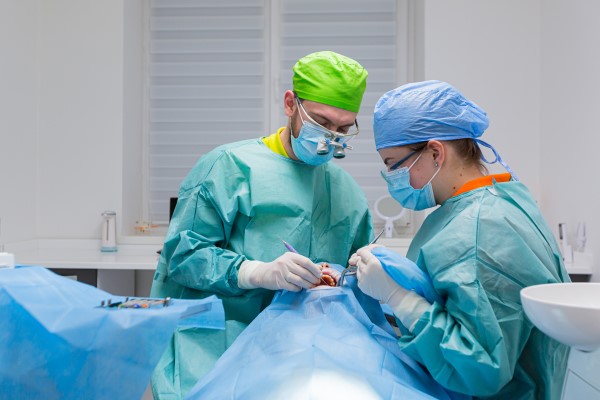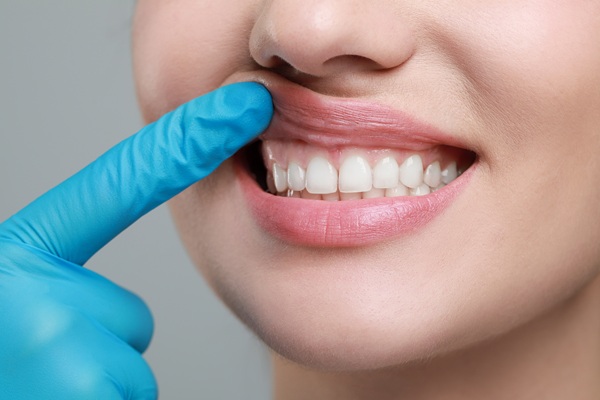Oral Surgery: Recovering From a Tooth Extraction

If you have an oral surgery procedure coming up, read on to learn more about the process and recovery. The extraction of a tooth requires oral surgery and it typically comes with a 10-day recovery period. The key to a quick recovery from a tooth extraction is keeping the blood clot that develops in its socket as the area heals. The blood clot becoming dislodged leads to a painful condition known as a dry socket.
There are two main types of tooth extractions — simple and surgical. The former does not require any incisions to be made, while the latter does.
Oral surgery: Tooth extraction recovery
Doing the right things during the recovery period following oral surgery can help to speed things up. Here are some simple things patients can do:
- Take any prescribed painkillers as recommended
- Leave the piece of gauze used to stop the bleeding in the socket for about four hours after the surgery
- Use an ice pack to reduce any inflammation around the area. The ice should be placed on the affected cheek for about 15 minutes
- Gets lots of rest for the first 24 hours after the surgery. Avoid strenuous activities for the first few days
- Do not rinse the mouth, use a straw or spit for the first 24 hours after the treatment
- Avoid brushing for the first 48 hours after the treatment. Use a saltwater solution to rinse the mouth instead
- Avoid smoking as it slows down recovery
- Prop your head up with a pillow when going to sleep
- Stick to soft foods for the first seven days after the treatment
Managing pain after oral surgery
It is normal to experience some pain, soreness, and discomfort after a tooth has been extracted. Patients might also experience some facial swelling around the area. Dentists usually provide patients with prescription painkillers to manage the pain. Patients are advised to take these painkillers as prescribed.
The pain should begin to go away after a few days. Visit a dentist if the pain persists for more than three days or if it intensifies, as this might be a sign of dry sockets or an infection.
For most patients, the healing period lasts somewhere between one to two weeks. Once that period has passed, the patient will be able to return to their regular diet. As the site heals, new gum and bone tissue will grow over the extraction site. It should be noted that extracting a tooth can lead to teeth alignment issues if the tooth is not replaced, as teeth naturally move toward any gaps in a person's smile in an attempt to close it up.
Most dentists will opt to replace the extracted tooth with a prosthetic like a dental implant. Wisdom teeth do not need to be replaced with a prosthetic when extracted since they are not essential.
FAQs about tooth extractions
Think you need an extraction? Here are the answers to some of the questions you might have:
When is tooth extraction recommended?
Many adults will have a tooth extracted at some point in their lives. Some of the reasons the procedure might be recommended include:
- Overcrowding: A dentist might recommend extraction if a patient doesn’t have enough room on their upper or lower jaw for all of their teeth. A tooth can be removed to make more space for the remaining teeth before starting teeth straightening treatments
- Impacted wisdom teeth: An impacted tooth fails to erupt properly and gets stopped in gum or bone tissues. The wisdom teeth are the last set of teeth to emerge, so they are more likely to be impacted due to not having enough space on the jaw
- Severe tooth decay: A severely decayed tooth that cannot be saved is typically extracted and replaced with an oral prosthetic
- Broken tooth: A broken tooth that cannot be saved is also extracted and replaced with an artificial tooth
- Gum disease: The advanced stages of periodontal disease damage bone and gum tissues in the mouth, loosening teeth. Over time, a dentist might have to extract some of these teeth
How long does recovery from oral surgery take?
How long it takes for a patient to recover varies based on factors like the severity of their dental problem and the extracted tooth’s location. Most people recover within seven to 14 days after getting their teeth pulled. It often takes longer than that for new bone tissue to grow in the tooth’s socket.
Do you need oral surgery?
At times, tooth extraction might be the best way to deal with your dental issue. You can speed up the recovery process by following the tips listed above and getting lots of rest.
Request an appointment here: https://corderoperiodontics.com or call Rafael E. Cordero, DDS PA at (561) 763-9221 for an appointment in our Palm Beach Gardens office.
Check out what others are saying about our dental services on Yelp: Oral Surgery in Palm Beach Gardens, FL.
Recent Posts
Undergoing oral surgery can feel overwhelming, but proper post-operative care is crucial to ensure a smooth recovery. Whether you have had wisdom teeth removed, dental implants placed, or another procedure, following the right recovery steps can help minimize discomfort and prevent complications.First and foremost, the oral surgeon will provide detailed post-operative care instructions specific to…
Corrective jaw surgery is not something very many people are familiar with. This surgery can help with a number of issues that could be impacting a person’s health or appearance. Understanding the critical facts related to this corrective procedure is important for patients who are having challenges caused by the shape, position or health of…
When one or more of the teeth are missing, the oral surgeon will recommend the best option to replace them. The alternative to bridges, partial or full dentures are dental implants, which replace the root of the lost tooth and support a dental prosthesis. They are the closest option to natural teeth available. Continue reading…
In some cases, dental issues need to be handled by an oral surgeon. Before proceeding with oral surgery, the dental professional will examine your condition and decide the best approach to the problem. In most cases, the procedures are handled on an outpatient basis, and patients can get back to their routine within a few…


